- Home
- Rudy Rucker
Mad Professor
Mad Professor Read online
MAD
PROFESSOR
MAD
PROFESSOR
The Uncollected Short Stories of
RUDY RUCKER
THUNDER’S MOUTH PRESS
NEW YORK
MAD PROFESSOR
The Uncollected Short Stories of Rudy Rucker
Published by
Thunder’s Mouth Press
An imprint of Avalon Publishing Group, Inc.
245 West 17th Street, 11th floor
New York, NY 10011
Copyright © 2007 by Rudy Rucker
First printing, 2007
All rights reserved. No part of this publication may be reproduced or transmitted in any form or by any means, electronic or mechanical, including photocopy, recording, or any information storage and retrieval system now known or to be invented, without permission in writing from the publisher, except by a reviewer who wishes to quote brief passages in connection with a review written for inclusion in a magazine, newspaper, or broadcast.
Library of Congress Cataloging-in-Publication Data is available.
ISBN-10: 1-56025-974-4
ISBN-13: 978-1-56025-974-9
9 8 7 6 5 4 3 2 1
Book design by Maria E. Torres
Distributed by Publishers Group West
For Robert Sheckley, 1928–2005
The premise could be seen wavering, there were repercussions of a rhetorical nature, and the author could be glimpsed, a ghostly figure of unbelievable beauty and intelligence, trying desperately, despite his many personal problems, to put things together again.
–Robert Sheckley, Minotaur Maze
CONTENTS
Introduction
2+2=5 (Written with Terry Bisson)
Elves of the Subdimensions (Written with Paul Di Filippo)
Panpsychism Proved
MS Found in a Minidrive
The Men in the Back Room at the Country Club
Guadalupe and Hieronymus Bosch
Six Thought Experiments Concerning the Nature of Computation
Jenna and Me (Written with Rudy Rucker Jr.)
The Use of the Ellipse the Catalog the Meter & the Vibrating Plane
Junk DNA (Written with Bruce Sterling)
Pockets (Written with John Shirley)
Cobb Wakes Up
Visions of the Metanovel
Notes on the Stories
INTRODUCTION
OF course I’m not a mad professor—everything I write and do is perfectly logical! Come right this way, step into my laboratory, and you’ll see for yourself. Careful not to touch that lever—whoops, you’ve turned on a lecture.
I might characterize my fiction by four qualities:
• Thought experiments
• Power-chords
• Gnarliness
• Wit
The notion of fictional thought experiments was made popular by no less a mad professor than Albert Einstein, who fueled his science speculations with Gedankenexperimenten. Thought experiments are a very powerful technique of philosophical investigation. In practice, it’s intractably difficult to visualize the side effects of new technological developments. In order to tease out the subtler consequences of current trends, a complex fictional simulation is necessary; inspired narration is a more powerful tool than logical analysis. If I want to imagine, for instance, what our world would be like if ordinary objects were conscious, then the best way to make progress is to fictionally simulate a person discovering this.
The kinds of thought experiments I enjoy are different in intent and in execution from merely futurological investigations. I’m not necessarily trying to make useful predictions that businessmen can use. I’m more interested in exploring the human condition, with literary power chord standing in for archetypal psychic forces.
+ + +
When I speak of power chords in the context of fantastic literature, I’m talking about certain classic tropes that have the visceral punch of heavy musical riffs: blaster guns, spaceships, time machines, aliens, telepathy, flying saucers, warped space, faster-than-light travel, immersive virtual reality, clones, robots, teleportation, alien-controlled pod people, endless shrinking, the shattering of planet Earth, intelligent goo, antigravity, starships, ecodisaster, pleasure-center zappers, alternate universes, nanomachines, mind viruses, higher dimensions, a cosmic computation that generates our reality, and, of course, the attack of the giant ants.
When I use a power chord, I try to do something fresh with the trope, perhaps placing it into an unfamiliar context, perhaps describing it more intensely than usual, or perhaps using it for a novel thought experiment. I like it when my material takes on a life of its own. This leads to what I call the gnarly zone.
+ + +
I discuss my concept of gnarl at length in my nonfiction tome, The Lifebox, the Seashell, and the Soul: What Gnarly Computation Taught Me about Ultimate Reality, the Meaning of Life, and How to Be Happy (Thunder’s Mouth Press, 2005).
In short, a gnarly process is complex and unpredictable without being random. If a story hews to some very familiar pattern, it feels stale. But if absolutely anything can happen, a story becomes as unengaging as someone else’s dream. The gnarly zone is lies at the interface between logic and fantasy.
I see my tales as simulated worlds in which the characters and tropes and social situations bounce off each other like eddies in a turbulent wake, like gliders in a cellular automaton graphic, like vines twisting around each other in a jungle. When I write, I like to be surprised.
William Burroughs was an ascended master of the gnarl. He believed in having his work take on an autonomous life to the point of becoming a world that the author inhabits. “The writer has been there or he can’t write about it. . . . [Writers] are trying to create a universe in which they have lived or where they would like to live. To write it, they must go there and submit to conditions that they might not have bargained for.” (From “Remembering Jack Kerouac” in The Adding Machine: Selected Essays, Seaver Books 1986.)
+ + +
And now a few words about wit. Robert Sheckley, to whose memory Mad Professor is dedicated, was a supremely witty writer. Over the years I got to spend a few golden hours in Sheckley’s presence. And I think it’s safe to say that wit, rather than mere humor, characterizes his work.
Wit involves describing the world as it actually is. You experience a release of tension when you notice a glitch. Something was off-kilter, and now you see what it was. The elephant in the living room has been named. The evil spirit has been incanted. Perceiving an incongruity in our supposedly smooth-running society provokes a shock of recognition and a concomitant burst of laughter. Wit is a critical-satirical process that can be more serious than the “humorous” label suggests.
In this vein, Sheckley writes: “Good fiction is never preachy. It tells its truth only by inference and analogy. It uses the specific detail as its building block rather than the vague generalization. In my case it’s usually humorous—no mistaking my stuff for the Platform Talk of the 6th Patriarch. But I do not try to be funny, I merely write as I write. . . . In the meantime I trust the voice I can never lose—my own . . . enjoying writing my story rather than looking forward to its completion.” (From “Amsterdam Diary” in Semiotext[e] SF, Autonomedia 1997.)
+ + +
The “mad professor” theme is itself a classic power chord.
One way to think of the trope is as a dialectic triad: the thesis of the dry professor and the antithesis of the unpredictable artist are synthesized into the mad professor—like Dr. Jekyll and Mr. Hyde sharing a single body.
A different way to think of it is that being mad is actually part of being a professor, and not any kind of aberration. Professors, after all, have their heads in t
he clouds. They don’t see things like regular people do.
In the famous allegory of the cave in Book VII of The Republic, Plato describes a race of humans who spend their lives staring at shadows on the wall of a cave. From time to time some of them escape from the cave into the higher world. Having experienced the light of the true Sun, when they return to the prison of the cave their eyes are a bit slow in catching the subtleties of the shadow-play that ordinary men and women deem to be the entire real world—they’re like absent-minded professors.
“And if there were a contest, and he had to compete in measuring the shadows with the prisoners who had never moved out of the den, while his sight was still weak, and before his eyes had become steady . . . would he not be ridiculous? Men would say of him that up he went and down he came without his eyes; and that it was better not even to think of ascending; and if any one tried to loose another and lead him up to the light, let them only catch the offender, and they would put him to death.”
Further shadings in the mad professor archetype can be found by distinguishing it from the mad scientist. What’s the difference? Professors tutor and counsel their students, they lecture and teach, they publish books and papers. They’re social. It’s not enough for a mad professor to gloat over the secret of reality in a dungeon lab as a mad scientist might. No, the mad professor is driven to write up what he or she saw, and to try and make everyone understand it. Another difference would be that the professors, who are less goal-oriented than the scientists, love erudition for its own sake, and affect a high literary style studded with quotes from timeless intellectual figures such as William Burroughs, Robert Sheckley, and Plato.
+ + +
I’m certainly a professor. I started my academic career as a calculus section tutor in graduate school forty years ago. I worked as a professor of mathematics for about twenty years, and spent the following twenty as a professor of computer science. Two years ago I retired and became an emeritus professor, which means I get to stay home all the time.
I admit to being contrary, unpredictable, and idiosyncratic. But mad? Of course not. As my character Bela Kis puts it in my recent novel Mathematicians in Love (Tor Books, 2006): “Crazy means illogical. I’m logical. Therefore I’m not crazy. Note that a system can be at the same time logical and unpredictable.”
For this volume, I’ve arranged my stories in reverse chronological order; with the most recent ones first, and the oldest ones last. There’s one exception to this rule: although I wrote “Visions of the Metanovel” this week while putting the anthology together, it seems to work best as a closing piece. Further information about the individual stories can be found in the Notes section at the back of the book.
Five of the eighteen pieces in Mad Professor were written with other authors. One of the remarkable things about fantastic literature is the level of literary collaboration that it supports. In this respect, we’re like scientists—and like musicians. We conduct our thought experiments, we jam our power chords, and if all goes well, we style our work with gnarl and wit.
By the way, the picture at left shows me working on this introduction in my backyard. Enjoy the book!
–Rudy Rucker,
Los Gatos, California, May 22, 2006
2+2=5
(WRITTEN WITH TERRY BISSON)
OLD age is all about killing time. One evening Jack and I walked the quarter mile from our Journey’s End retirement complex to the Hump’s chain coffee shop in the strip mall, traffic whizzing by, everyone but us with someplace to go.
The shop was just about deserted and a couple of the barrista guys were having a discussion. One was offering the other fifty or even sixty dollars to do something boring. I didn’t catch what the boring thing was, so when the second guy came to wipe our tabletop, I asked him.
“He was wondering if someone paid me, would I count out loud to ten thousand by ones,” said the boy, fingering the ring in his nose, which was kind of an exotic accoutrement for Harrods Creek, Kentucky. “But it would be too stupid,” he added. He moved across the empty room, straightening chairs.
I did a quick pencil-and-paper calculation while Jack sipped his chamomile tea. I used to be an insurance adjuster, and numbers are my thing. “I figure I could probably count to ten thousand in the course of a day,” I told Jack in a bit.
He argued about this, of course—something about holes in the number line—but then he flipped to my point of view and pushed the calculation further, working it in his head. Before they fired him for his nervous breakdown, Jack was a math professor at the University of Louisville. “You could count to ten million in a year,” Jack announced after a minute. “And maybe if a person said the words really fast, they could hit a billion before they died. Assuming they started young. Assuming they didn’t pay very close attention.”
I called over the barrista with the nose-ring and told him the news, but his mind was already on other things. “We’re about to close,” he said.
“Maybe I should start counting,” I told Jack as the boy wandered off. “I could set a Winners World Record. My own taste of immortality.”
“Let’s see about that,” said Jack, hauling out the oversized cell phone he carried in his pants pocket. It was an off-brand model, a Whortleberry that he’d picked out of a sale bin at the Radio Shack in the strip mall near our rest home. He carried it with him all the time, not that anyone ever called him or me, other than telemarketers. Our wives were dead, and our kids had moved to the coasts. They couldn’t find interesting work in Kentucky. Jack and I had each other, Nurse Amara, and Hector, the fellow who did the dishes and made up our rooms.
“See what?” I asked Jack.
“See if there’s a counting-to-highest-number category on the Winners Web site.” Drawing out his smeared, heavy reading glasses he began pecking at the tiny buttons on the fat cell phone. “I get the Web on this sucker, remember, Bert?”
“Fuck computers,” I said. “A Java script put me out of my job.”
“Like I haven’t heard you say that seven hundred times,” said Jack. “Loser. Dinosaur. Old fool.”
“At least I didn’t go crazy and scare my students,” I said. “Telling them the world is made of holes. Screwball. Nut. Psycho.”
“Four hundred times for that remark,” said Jack, prodding the minute keyboard with the tip of his pen. “I wasn’t crazy, I was right. The world is like an engine-block gasket, or, no, like a foam. The holes triangulate the universe; they’re the tent stakes, as it were, that keep the whole thing from blowing away. And the big secret is—oh, you’re not ready yet. Here’s Winners.” He set the cell phone on the table so that I could see the screen. What I saw was a blurred flickering smudge. “Your glasses,” Jack reminded me, not unkindly.
I found my smeared, heavy reading glasses and studied the display. The Winners Web site was an outgrowth of the old Guinness Book of World Records, the difference being that Winners had far more categories. They made their money by harvesting information about the record holders so they could be targeted with ads.
“Says the Unaided Counting Record is twelve million, three hundred and forty-five thousand, six hundred and seventy-eight,” I said, squinting at the tiny screen.
“12,345,678,” echoed Jack, just saying the digits. “A tidy place to stop. It took the guy nearly two years. Clyde Burns. Says here he’s a Buddhist monk in Wichita, Kansas.”
“Closing time, gentlemen,” said the barrista.
“Okay, okay.”
Walking back, we discussed the project some more. Cars whizzing by. Low beige buildings in a parking lot. Dark green pastures and trees. A rustling cornfield.
“The monk counted for two years!” I said. “Two years is a lifetime when you’re my age.”
“That’s the problem with immortality,” mused Jack. “You never live long enough to get there.”
+ + +
For breakfast we have a choice: oatmeal or powdered eggs. I chose oatmeal. Jack joined me at my table, stirrin
g his eggs.
He was smiling. “There’s a hole in their rules,” he said.
“Huh?”
“There’s a hole in eveiything,” he explained. “The universe itself can be described as a fractal pattern of holes in nonexistence. A temporary but nonetheless . . .”
“Never mind your crackpot theories about the universe,” I said. I had the feeling—or was it a hope?—that he was talking about the Winners Web site. “What about their rules?”
“You’re not required to vocalize the numbers, or even subvocalize. Just count.”
“You still have to think them,” I said. “It’ll still take me two years to get to where the mad monk left off.”
“Think biocomputation,” said Jack. “Think auxiliary processing.”
“Huh?”
To make a long story short, which is what old age is all about, when you think about it, which I try not to do, Jack said he could hook me up to a computer that would speed up my brain cells.
“Neurons are just switches,” he said. “Firing or resting: binary. They can interface to a chip. And as long as they’re controlling the counting, it’s legal under the Winners rules.”
I toyed with my oatmeal. “You want me to swallow a chip? Or get an implant?” As usual the oatmeal was lumpy.
“Wait till tonight,” said Jack, glancing suspiciously around the dining room. As if anyone were there but Hector and our deaf, senile peers. “I’ll show you tonight.”
After an evening of watching the McNguyen and the Pootie Party shows, I followed Jack to the room we shared at Journey’s End. I was apprehensive, but eager to achieve immortality.
“Voilà,” he said. He showed me a knit skull cap. It was blue and orange and silver. It was the worst job of knitting I had ever seen, and I told him so.
“One of my University of Louisville honors students made it for me,” he said. “An extra credit grab. She had a B, and she wanted . . .”

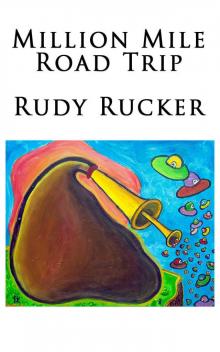 Million Mile Road Trip
Million Mile Road Trip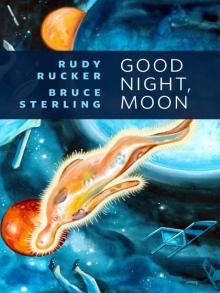 Good Night, Moon
Good Night, Moon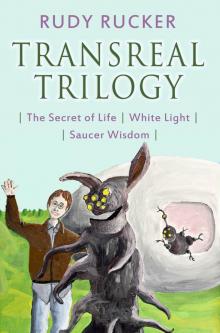 Transreal Trilogy: Secret of Life, White Light, Saucer Wisdom
Transreal Trilogy: Secret of Life, White Light, Saucer Wisdom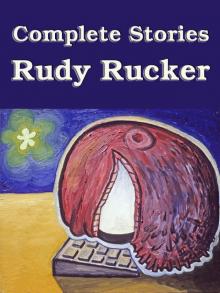 Complete Stories
Complete Stories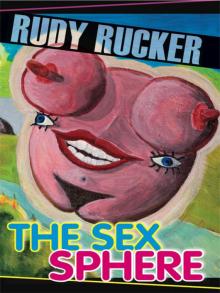 The Sex Sphere
The Sex Sphere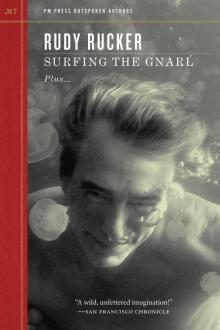 Surfing the Gnarl
Surfing the Gnarl Software
Software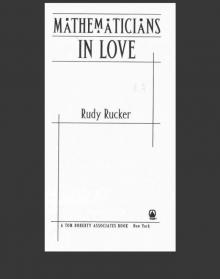 Mathematicians in Love
Mathematicians in Love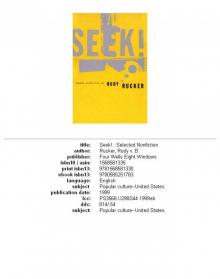 Seek!: Selected Nonfiction
Seek!: Selected Nonfiction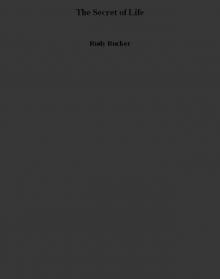 The Secret of Life
The Secret of Life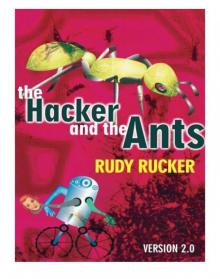 The Hacker and the Ants
The Hacker and the Ants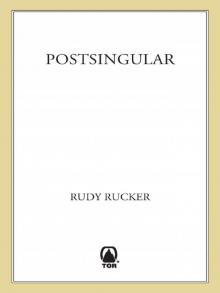 Postsingular
Postsingular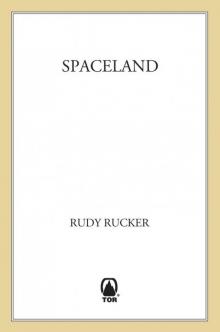 Spaceland
Spaceland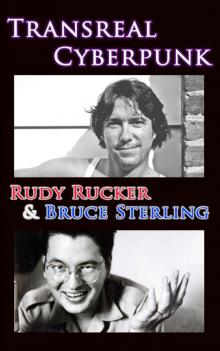 Transreal Cyberpunk
Transreal Cyberpunk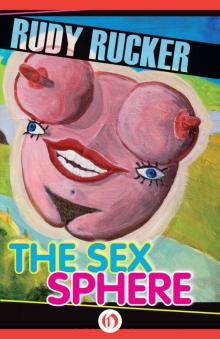 Sex Sphere
Sex Sphere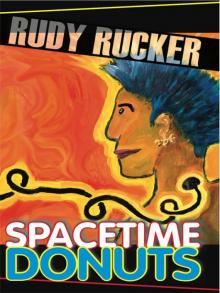 Spacetime Donuts
Spacetime Donuts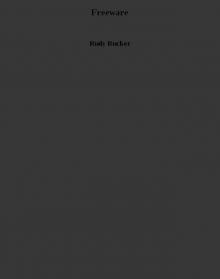 Freeware
Freeware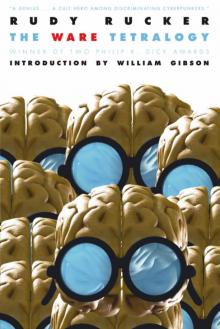 The Ware Tetralogy
The Ware Tetralogy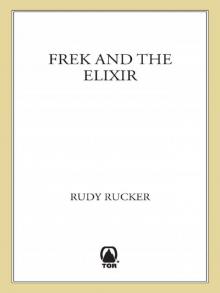 Frek and the Elixir
Frek and the Elixir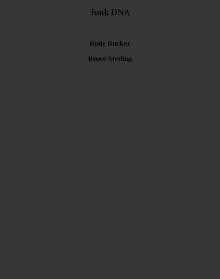 Junk DNA
Junk DNA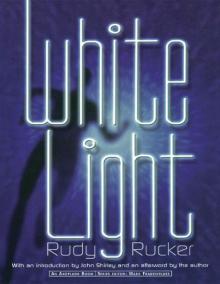 White Light (Axoplasm Books)
White Light (Axoplasm Books)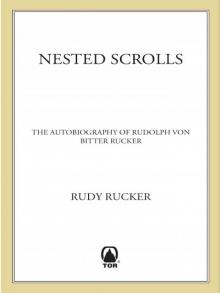 Nested Scrolls
Nested Scrolls Inside Out
Inside Out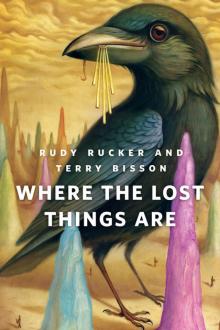 Where the Lost Things Are
Where the Lost Things Are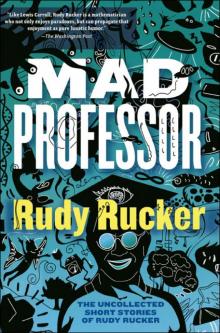 Mad Professor
Mad Professor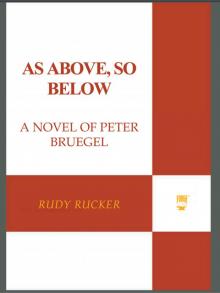 As Above, So Below
As Above, So Below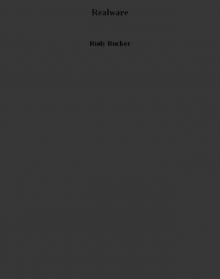 Realware
Realware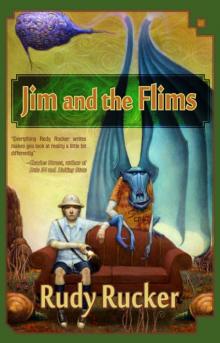 Jim and the Flims
Jim and the Flims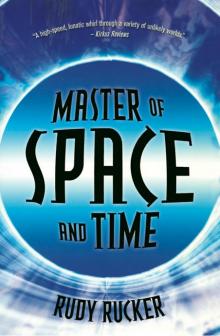 Master of Space and Time
Master of Space and Time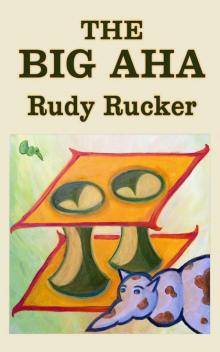 The Big Aha
The Big Aha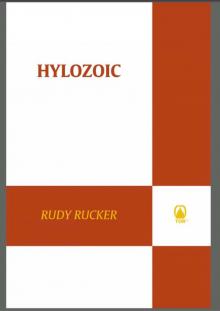 Hylozoic
Hylozoic